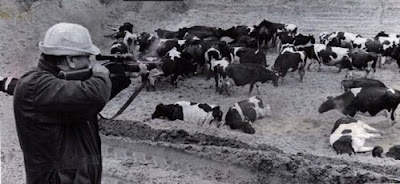Book Review: 'The Poison that Fell from the Sky' by John G. Fuller
At 12:37 in the afternoon of Saturday, July 10, 1977, people living in the vicinity of the town of Meda, Italy, heard a muffled explosion coming from the grounds of the ICMESA chemical plant.
A cloud of white smoke rose into the air above the plant, and in the ensuing hours, drifted over Meda and the nearby towns of Seveso, Desion, and Cesano Maderno. At least 1,000 acres - much of it consisting of small farms and residential areas - was contaminated by the cloud.
The residents of the affected areas described seeing a 'fog' that left a wet residue where it touched and had a bitter, acrid odor. Within hours of the passage of the cloud, the residents noticed that the vegetation began to display patterns of yellow spotting.
After the cloud dissipated, the residents of Seveso and the other affected towns shrugged and resumed eating lunch, and harvesting the fruits, vegetables, and livestock that many families raised to supplement their diets.
But before nightfall, many residents who had been in the path of the cloud began to notice health problems, including the emergence of sores and lesions on their skin. Other residents noticed small animals dying from the effects of the cloud; some even saw birds literally dropping from the sky.
A day after the explosion at the plant and the formation of the toxic cloud, the director of the ICMESA plant asked the mayor of Seveso to convey a warning to the town's residents: they should not eat any fruit from their trees.
As the week began, more and more residents began to complain of illness associated with the passage of the cloud. On Friday, July 16, a two year-old baby was hospitalized with weeping sores all over his body.
As the residents of Seveso - and then an entire region of Lombardy, Italy - were about to learn, they were the victims of the greatest toxic disaster ever to strike Europe.....
In 'The Poison the Fell from the Sky' (first published in hardback in 1977; this 163 pp, Berkley Books paperback was released in January 1979) John G. Fuller provides firsthand reportorial coverage of the accident (he was in France in 1976, and was assigned by The Reader's Digest to investigate the Seveso disaster).
Fuller toured the Seveso region later in the Summer and early Fall of 1976, and spoke with many of the victims, ICMESA / Roche officials, journalists, and public health officials.
Fuller - an accomplished writer, whose other nonfiction books include Fever, a 70s classic about the investigation of an outbreak of a deadly viral disease - communicates the atmosphere of dread and uncertainty that fell over much of Italy due to the disaster.
An unavoidable drawback of the book is that, being written comparatively early in aftermath of the disaster, it cannot provide an analysis of the long-term complications of the disaster. But Fuller does include a final chapter that examines the disturbing history of toxic disasters up to 1976 and highlights how the negligence of the chemical industry was often a key trigger for these disasters.
Summing up, 'The Poison that Fell from the Sky' remains a worthy account of the Seveso disaster. It's worth getting if you see it on the shelves of your used bookstore.












































































